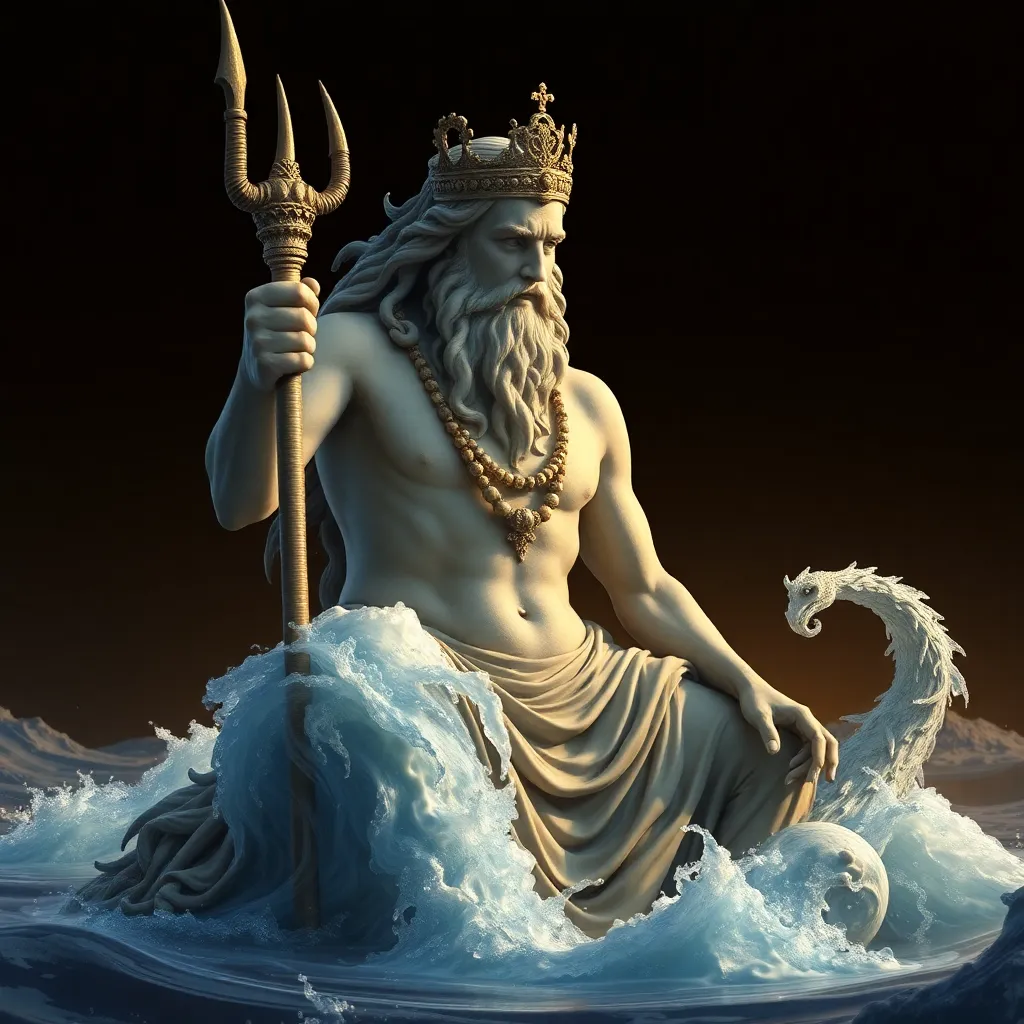The Connection Between Poseidon and the Concept of Fate
I. Introduction
Poseidon, the ancient Greek god of the sea, earthquakes, and horses, is one of the most prominent figures in Greek mythology. His role extends beyond mere dominion over oceans; he embodies the unpredictable and often tumultuous nature of fate itself. In ancient Greek culture, fate is a powerful concept, often personified by the Moirai, or Fates, who weave the destinies of gods and mortals alike. This article explores how Poseidon not only embodies the concept of fate but also influences it through his actions and character in mythology and literature.
II. Poseidon: The God of the Sea
As one of the twelve Olympian deities, Poseidon holds significant importance in Greek mythology. He is often depicted as a robust figure, wielding a trident, which symbolizes his rule over the sea and his ability to create or calm storms and tidal waves.
- Role and Significance: Poseidon is revered not just as the god of the sea, but also as a deity who governs horses and earthquakes, signifying his multifaceted nature.
- Attributes and Symbols: His symbols include the trident, horses, and dolphins, which highlight his connection to both the sea and land.
- The Duality of Nature: Poseidon embodies a duality; he is both a creator, providing resources and calm seas, and a destroyer, capable of unleashing devastating storms and earthquakes.
III. Understanding Fate in Greek Mythology
Fate, in Greek thought, is an inescapable force that governs the destiny of all beings. The ancient Greeks believed that fate was predetermined and unchangeable, even by the gods themselves.
- Definition of Fate: In Greek mythology, fate is often referred to as the inevitable course of events that is decreed by the Fates.
- The Three Fates: Clotho, Lachesis, and Atropos represent the stages of life: spinning the thread of life, measuring it, and cutting it, respectively.
- Divine Will vs. Human Agency: There exists a complex interplay between divine will, as exercised by gods like Poseidon, and human agency, where mortals make choices that may or may not align with their fated paths.
IV. Poseidon’s Influence on Fate
Poseidon’s actions in various myths reveal his significant influence over the fates of mortals and gods alike. His temperament often results in dramatic shifts in these destinies.
- Direct Interventions: In the myth of Odysseus, Poseidon plays a pivotal role in prolonging the hero’s journey home due to the mortal’s disrespect towards him.
- Temperamental Nature: Poseidon’s wrath can alter the course of human lives drastically, demonstrating the volatility of fate influenced by divine emotions.
- Tension Between Power and Fate: The stories of Persephone and Theseus illustrate the struggle between Poseidon’s powers to influence fate and the ultimate inevitability of the Fates’ design.
V. Poseidon and Human Suffering
Many myths highlight the tragic outcomes resulting from Poseidon’s actions, often reflecting the idea of fate as a form of divine justice.
- Contributions to Tragic Outcomes: In the tale of the Trojan War, Poseidon’s support for the Greeks leads to significant suffering for both sides, showcasing how divine intervention can lead to human misery.
- Divine Justice: The concept of fate as a form of divine justice is often illustrated through Poseidon’s punishments of mortals, such as the case of the city of Troy.
- Specific Myths: The story of the Minotaur and King Minos reveals how Poseidon’s anger leads to the suffering of both the king and his citizens, further emphasizing the link between Poseidon and fate.
VI. Literary Representations of Poseidon and Fate
Poseidon’s character has been explored in classical texts and modern interpretations, reflecting the evolving understanding of fate and divine influence.
- Classical Texts: Works such as Homer’s “Iliad” and “Odyssey” depict Poseidon as a powerful deity whose actions shape the fates of heroes and cities.
- Modern Interpretations: Contemporary literature and films often reinterpret Poseidon, exploring themes of fate in new contexts, such as in Rick Riordan’s “Percy Jackson” series, where Poseidon’s legacy impacts modern demigods.
- Evolution of Connection: The portrayal of Poseidon and his relationship with fate has evolved, reflecting changing cultural values and beliefs about divine influence over human lives.
VII. Philosophical Perspectives on Poseidon and Fate
The theological implications of Poseidon’s role in fate raise interesting discussions among ancient philosophers and contemporary thinkers.
- Theological Implications: Poseidon’s influence on fate poses questions about the nature of divinity and the extent of divine control over mortal lives.
- Ancient Philosophers: Philosophers like Heraclitus and Plato discussed fate in relation to divine influence, considering how the gods’ whims might affect human destiny.
- Contemporary Views: Modern interpretations continue to explore the relevance of Poseidon in understanding fate, often relating it to concepts of free will and determinism.
VIII. Conclusion
In summary, Poseidon’s role in Greek mythology is deeply intertwined with the concept of fate. From his powerful influence over human destinies to his embodiment of the dual nature of creation and destruction, Poseidon serves as a crucial figure in understanding the complexities of fate in ancient culture. His legacy continues to resonate through literature and philosophy, prompting reflection on the nature of divine influence and human agency. The exploration of Poseidon and fate not only enriches our understanding of Greek mythology but also offers insights into the timeless human struggle against the forces that shape our lives.
https://www.youtube.com/watch?v=2rnyeDhR1zI




